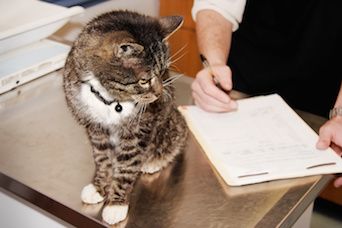Prevalence of Feline Heartworm Infection in the United States
A recent study has found that hundreds of thousands of cats in the United States are likely infected with heartworms—and that may be a low estimate.

According to the results of a study published last month in the Journal of the American Veterinary Medical Association, the overall seroprevalence of heartworm infection in cats in the United States is 0.4%. The highest prevalence was found to be in southern states. The risk for heartworm infection among study cats was increased in cats that had outdoor access, were ill at the time of testing, or were also infected with a retrovirus.
The signs of heartworm disease in cats can range from respiratory disease to sudden death. Because curative treatments used for dogs are not safe for cats, all cats should receive heartworm preventives, say the authors of the report.
“Cats are at risk for infection with the agent of heartworm disease, Dirofilaria immitis, wherever infected dogs exist,” they write. “At an estimated prevalence of 0.4%, hundreds of thousands of cats in the United States are likely infected with heartworms.”
The investigators analyzed serologic test results collected from nearly 35,000 cats by veterinary clinics and animal shelters in all 50 states and 7 of 10 Canadian provinces. From March to September 2010, participating clinics and shelters tested cats with a point-of-care combination test for heartworm antigen, feline leukemia virus antigen, and feline immunodeficiency virus antibody.
The reports included each cat’s signalment and health status. Veterinary clinics also reported the reason for testing and whether each cat was prescribed a heartworm preventive at the time of the test (but not whether cats had received prescriptions previously).
Heartworm antigen tests were positive in 141 (0.4%) cats. Of the cats with detectable heartworm antigen, 85% had outdoor access, 59.6% were clinically ill at the time of testing, and 29.1% also had positive test results for a retrovirus. The most common health conditions reported in cats with heartworm infection were respiratory disease, abscesses, bite wounds, and oral disease.
The greatest risk factor for a positive heartworm test was a concurrent positive result on a retrovirus test. A positive test for 1 retrovirus increased the heartworm risk 2- to 4-fold, and positive tests for both retroviruses increased the heartworm risk about 25-fold. The authors note that retrovirus infection itself does not necessarily increase heartworm risk. Cats with outdoor access, for example, may be at increased risk for both heartworms and retrovirus infection.
Heartworm antigen tests were positive in cats in 35 states. The prevalence in individual states ranged from 0% to 1.6% (no tests were positive in Canada). In general, prevalence was highest in southern and midwestern states and lowest in northeastern and western states.
Overall, sex (male versus female) was not a risk factor for heartworm infection. However, heartworm infection was more prevalent in intact males than in neutered males.
Only 12.6% of cats received prescriptions for heartworm preventives at the time of testing. Heartworm preventives were prescribed most often in regions with the highest proportion of positive heartworm test results. The authors acknowledge that this finding may underestimate the actual percentage of cats receiving heartworm preventives.
The prevalence of heartworm seropositivity reported in this study may be lower than the true prevalence of feline heartworm infection, say the authors. Antigen tests do not detect immature or male heartworms. In addition, antigen—antibody complex formation can reduce the sensitivity of heartworm antigen tests. Anti-heartworm antibody tests may be positive in cats with negative heartworm antigen tests, they write.
The study was supported in part by Maddie’s Fund. IDEXX, the manufacturer of the point-of-care tests used in the study, provided purchase credits to participating clinics and shelters and has also funded previous work by the study’s lead author.
Dr. Laurie Anne Walden received her doctorate in veterinary medicine from North Carolina State University. After an internship in small animal medicine and surgery at Auburn University, she returned to North Carolina, where she has been in small animal primary care practice for over 20 years. Dr. Walden is also a board-certified editor in the life sciences and owner of Walden Medical Writing, LLC. She works as a full-time freelance medical writer and editor and continues to see patients a few days each month.